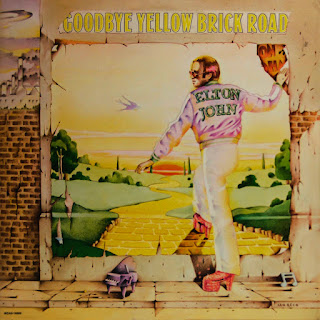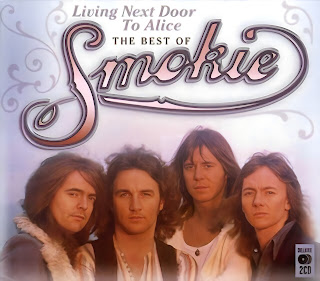Goodbye Yellow Brick Road: Rolling Stones #112 of 500 Greatest Albums of All Time (2020)
Studio album: Elton John
Recorded: May 1973
Released: October 5, 1973
Studio: Château d'Hérouville, France
Genre: Pop rock
Producer: Gus Dudgeon
Singles released:
Saturday Night's Alright for Fighting June 29, 1973
Goodbye, Yellow Brick Road
September 7, 1973
September 7, 1973
Bennie and the Jets February 4, 1974 (USA)
Candle in the Wind February 22, 1974 (UK)
Goodbye Yellow Brick Road, Elton John's best-selling album, ranks number 112 on Rolling Stone's list of the 500 Greatest Albums of All Time and 59 on Channel 4's list of 100 Greatest Albums. It was inducted into the Grammy Hall of Fame in 2003. The same year, it was included in the book 1001 Albums You Must Hear Before You Die.
It was designed to be a blockbuster and it was.Stephen Thomas Erlewine for Allmusic
John and his songwriting partner, Bernie Taupin, went to Jamaica to record Goodbye Yellow Brick Road. The Rolling Stones recently recorded Goats Head Soup there. But it wasn't happening for John. A poor sound system and civil unrest hampered their output. The band packed up and moved to Château d'Hérouville, France; where they'd taped Honky Chateau and Don't Shoot Me, I'm Only a Piano Player.
Taken a side at a time, or even a song at a time, Goodbye Yellow Brick Road is a thing of wonder, serving up such perfectly sculpted pop songs as "Grey Seal," full-bore rockers as "Saturday Night's Alright for Fighting," and "Your Sister Can't Twist (But She Can Rock & Roll)," cinematic ballads like "I've Seen That Movie Too," throwbacks to the dusty conceptual sweep of Tumbleweed Connection in the form of "The Ballad of Danny Bailey (1909-34)," and preposterous glam novelties, like "Jamaica Jerk-Off." Allmusic
Single: Elton John
Album: Goodbye Yellow Brick Road
Released: June 1973
Recorded: May 1973
Genre: Glam rock, rock & roll, proto-punk
Songwriters: Elton John, Bernie Taupin
"Saturday Night's Alright (For Fighting)" was the first single from Yellow Brick Road. The only track taped in Jamaica, Elton John described it as sounding like "it was recorded on the worst transistor radio." The song was re-recorded in France for the album.
Carries 'Crocodile Rock' one step further.Cash Box
In an Eagle Vision documentary, Classic Albums: Goodbye Yellow Brick Road, Taupin said that the song features one of the most significant "strident, blistering guitar chords ever created" in rock and roll.
According to Taupin, "Saturday Night's Alright (For Fighting)" is about his teen years at British dance clubs, where fights were common. Unlikely as it is Elton John would be fighting in bars, the 2019 biographical musical Rocketman uses the song in a coming-of-age scene for John.
Opening with the 11-minute melodramatic exercise "Funeral for a Friend/Love Lies Bleeding" -- as prog as Elton ever got -- Goodbye Yellow Brick Road immediately embraces excess but also tunefulness, as John immediately switches over to "Candle in the Wind" and "Bennie & the Jets," two songs that form the core of his canon and go a long way toward explaining the over-stuffed appeal of Goodbye Yellow Brick Road. Allmusic
Single: Elton John
Album: Goodbye Yellow Brick Road
B-side: Harmony
Released: February 4, 1974
Genre: Glam rock
Songwriters: Elton John, Bernie Taupin
The single "Bennie and the Jets" was released on an A-side in the United States and Canada. Everywhere else, it's on the B-side of "Candle in the Wind." The song tells of a fictional band through a fan. It ranks 371 on Rolling Stone's list of The 500 Greatest Songs of All Time.
Maybe we should fake-live this.Gus Dudgeon
Despite sounding live, the track was recorded in the studio. Live crowd reactions were added in later. Producer Gus Dudgeon explained in 1993:
"For some weird reason, Elton hit the opening piano chord of the song precisely one bar before the music started. So I was doing the mix, and this chord kept coming on, which you usually wouldn't expect to hear. I turned to the engineer and said,
'What does that remind you of? It's the sort of thing people do on stage before starting a song.' To get everybody, 'Okay, here we go, ready?' For some reason, that chord being there made me think, 'Maybe we should fake-live this.'"
In May 2017, an official "Bennie and the Jets" music video premiered at the Cannes Film Festival. Independent filmmakers submitted clips for one of three Elton John 1970s songs. The "Bennie and the Jets" short represented the choreography category, portraying the characters as participants in a talent show auditioning for Bennie.
Single: Elton John
Album: Goodbye Yellow Brick Road
B-side: Bennie and the Jets
Released: February 22, 1974
Genre: Pop rock, soft rock
Songwriters: Elton John, Bernie Taupin
Candle in the Wind 1974
"Candle In The Wind" is a tribute to Marilyn Monroe. Released as a single in the UK, it reached number 11 on the music charts. Rolling Stone Magazine ranked the original number 356 of its 500 Greatest Songs of All Time in 2004.
I think the biggest misconception about 'Candle In The Wind'is that I was this rabid Marilyn Monroe fanatic.Bernie Taupin to BBC News
 |
| Marilyn Monroe |
The opening line, "Goodbye, Norma Jean," refers to Monroe's real name, Norma Jean Baker. In the Eagle Vision documentary, Taupin said: "The biggest misconception is that I was this rabid Marilyn Monroe fanatic. That couldn't be further from the truth. It's not that I didn't have respect for her. The song could have been about James Dean or Jim Morrison, Kurt Cobain, Sylvia Plath, or Virginia Woolf."
Candle in the Wind 1987
Elton John recorded a live version of "Candle In The Wind" in 1987 on the last stop of his Australian tour. This version was finally released as a single in the USA.
It made number 6 on the American singles chart. In the UK, it peaked at number 5. It earned John a Grammy nomination in 1988 for Best Male Pop Vocal Performance.
Candle in the Wind 1997
Bernie Taupin rewrote the lyrics after Diana, Princess of Wales, died in a car accident in August 1997. He changed the first line from "Goodbye Norma Jean" to "Goodbye England's Rose." Elton played it at Princess Diana's funeral on September 6.
The new version of the song, titled "Candle In The Wind '97," was released as a single and dedicated to Princess Diana. Guinness World Records lists this as the second-best-selling single in the world. John won the 1997 Grammy Award for Best Male Pop Vocal Performance for "Candle In The Wind '97."
Single: Elton John
Album: Goodbye Yellow Brick Road
B-side: Screw You (Young Man's Blues)
Released:
September 7, 1973 (UK)
October 15, 1973 (US)
Genre; Soft rock, glam rock
Songwriters: Elton John, Bernie Taupin
The title track of Goodbye Yellow Brick Road lists at number 390 on Rolling Stone's 2004 list of the 500 Greatest Songs of All Time. Billboard placed the song 4th among the 75 Greatest Elton John songs. The Guardian ranked it 6th of the 50 Greatest Elton John Songs.
A vocal triumph...pinnacle of its style.AllMusic review
Music critic Stewart Mason wrote of it:
"Elton John's 'Goodbye Yellow Brick Road' is a small masterpiece of '70s soft rock and a strong contender for the coveted title of John's finest song ever. 'Goodbye Yellow Brick Road' is a pinnacle of its style and has remained one of John's signature songs for decades." Allmusic review
For the movie Rocketman, Taron Egerton (who played Bernie Taupin) sings this tune of EltJohn'sn's character.











Comments
Post a Comment